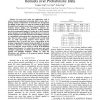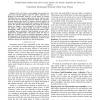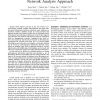144
click to vote
ICDE
2012
IEEE
13 years 4 months ago
2012
IEEE
—Traditional clustering algorithms identify just a single clustering of the data. Today’s complex data, however, allow multiple interpretations leading to several valid groupin...
166
click to vote
ICDE
2012
IEEE
13 years 4 months ago
2012
IEEE
Abstract—Relational database management systems are general in the sense that they can handle arbitrary schemas, queries, and modifications; this generality is implemented using...
155
click to vote
ICDE
2012
IEEE
13 years 4 months ago
2012
IEEE
—Many companies now routinely run massive data analysis jobs – expressed in some scripting language – on large clusters of low-end servers. Many analysis scripts are complex ...
155
click to vote
ICDE
2012
IEEE
13 years 4 months ago
2012
IEEE
—We demonstrate MXQuery/H, a modified version of MXQuery that uses hardware acceleration to speed up XML processing. The main goal of this demonstration is to give an interactiv...
182
click to vote
ICDE
2012
IEEE
13 years 4 months ago
2012
IEEE
—We demonstrate SWITCH, a deep embedding of relational queries into RUBY and RUBY on RAILS. With SWITCH, there is no syntactic or stylistic difference between RUBY programs that ...
175
click to vote
ICDE
2012
IEEE
13 years 4 months ago
2012
IEEE
— The web today is increasingly characterized by social and real-time signals, which we believe represent two frontiers in information retrieval. In this paper, we present Earlyb...
140
click to vote
ICDE
2012
IEEE
13 years 4 months ago
2012
IEEE
Abstract—Most objects and data in the real world are interconnected, forming complex, heterogeneous but often semistructured information networks. However, many database research...
200
click to vote
ICDE
2012
IEEE
13 years 4 months ago
2012
IEEE
Abstract—After decades of effort working on database performance, the quality and the usability of database systems have received more attention in recent years. In particular, t...
157
click to vote
ICDE
2012
IEEE
13 years 4 months ago
2012
IEEE
—MapReduce has emerged as a popular tool for distributed and scalable processing of massive data sets and is increasingly being used in e-science applications. Unfortunately, the...




